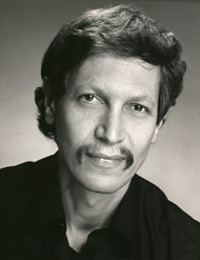
Moshe Cotel
(We are re-publishing this article from the
Summer 2003 Kulanu newsletter in memory
of Rabbi Moshe Cotel)
We Live in
Miraculous Times
By Rabbi Moshe Cotel
(Excerpted from an ordination speech the writer, a
Kulanu board member, gave at his graduation
from the Academy for Jewish Religion in May
2003)
We live in miraculous times. Last year I was
in northeastern rural Uganda serving on a Bet Din,
a rabbinical court, which officially welcomed the
native Abayudaya Ugandans into the worldwide
community of the people Israel.
When I asked one old man at that time, an
ancient man who had lived through the persecutions
of dictator Idi Amin - a tyrant who had
banned Judaism throughout the country - why he
would want to be part of a people universally despised
and persecuted throughout history, he replied
in a quiet but firm voice and with clear blazing
eyes: Because I fear Adonai.
Judaism is coming alive throughout the developing
world. I know that this is true because I
have seen it with my own eyes; I have heard it with
my own ears. I believe that in a hundred years a
typical Jewish face will be the face of Africa; in a
hundred years a typical Jewish face will be the face
of Asia.
We live in miraculous times and I wish to be
part of this miracle. But the miracle has another
side to it—and while there are signs that Judaism is
awakening in places throughout the world where
we never thought a native Jewish community could
exist—here in America, in the highly developed
technological world, there are disturbing countercurrents.
A whole new generation has come into being,
not across the ocean, but right here in our midst—
Generation X, divorced from communal Jewish
life and all but written off by our own vaunted
Jewish establishment. This is the other side of our
miraculous time. American Jews have never been
more powerful, more secure, more integrated into
the whole of society—and yet our young people
are opting out in droves.
We must find a way to make Judaism relevant
to our own alienated young here in the U.S. And,
paradoxically, we must also find a way to make
Judaism inclusive for countless seekers around the
world for whom our theology of liberation, based
upon the Exodus from Egypt, is an inspiration.
I intend to devote the rest of my life to wrestling
with this paradox—inreach at home, outreach
abroad. Our great religion has been reinvented and
reinvented again by each succeeding generation of
Jews. And now, we have to gather our strength to
reinvent Judaism yet once more.




